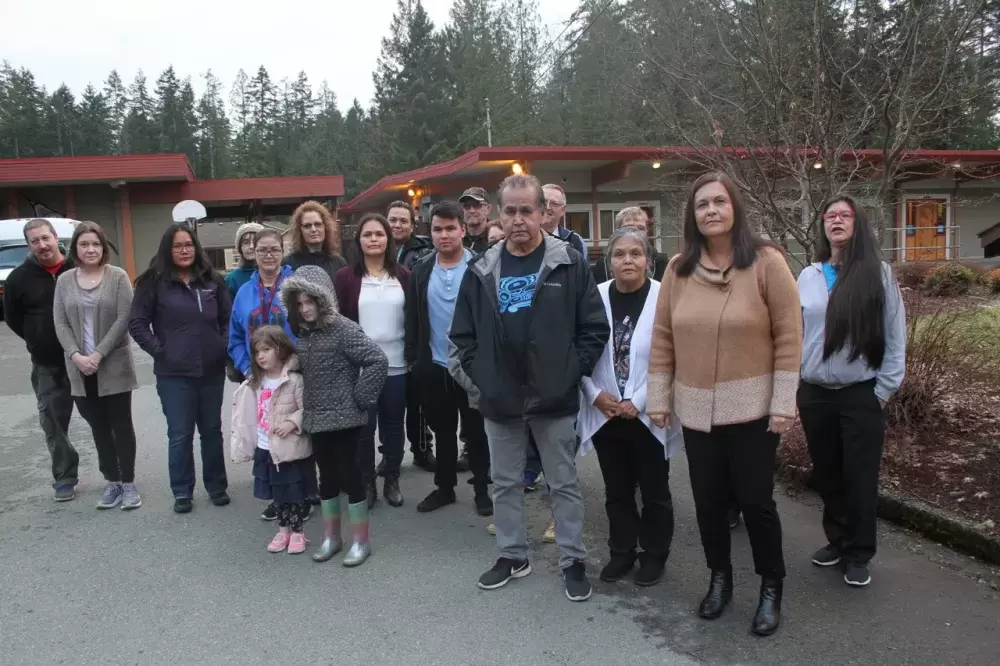Those who run a centre for families struggling with addiction and trauma fear that a medicinal pot factory being planned across the road could sabotage their recovery process.
The Kackaamin family Development Centre has been operating on the outskirts of Port Alberni for a decade, but concerns are growing that a 57,000-square-foot medicinal marijuana grow-op planned to be built across the road could ruin the centre’s atmosphere for addiction treatment. One of just three family-oriented recovery centres in Canada, Kackaamin takes in parents for six-week periods to help them manage their addictions, while operating a daycare and providing schooling for their children on site.
Executive Director Lisa Charleson-Robinson said the medicinal growing facility would be 140 metre’s from Kackaamin’s daycare.
“Would they consider putting it right across from a school?” she asked, concerned that the pot smell from the facility will trigger parents seeking addictions treatment. “It’s going to impact the way that we deliver service in the way that we have in a safe manner for our clients.”
Premium Cannabis Meds BC plans to develop a two-level research and production facility serving the growing international appetite for cannabis to treat pain and other medical issues. The company’s website states the facility will generate 250 jobs - which would make it one of the Alberni Valley’s largest employers – turning Port Alberni into “a hub for one of the largest exporters of Medical Cannabis production”.
Mejbien Sadeghi, the project’s developer, said the local government welcomed her proposal and its promise of an economic boost.
“The most cost-effective was Port Alberni,” she said of the location. “A lot of youth are forced to leave from Port Alberni because there are no jobs available that pay a decent salary, and this would be an opportunity to stay on.”
Faced with weighing this economic promise against heavy opposition from Kackaamin and its neighbours in the Beaver Creek community, the Alberni Clayoquot Regional District initially approved a building permit for Premium Cannabis in 2018. But as Canada prepared for all the logistical technicalities of marijuana legalisation, the facility’s application hit a snag in July of that year when the province banned concrete industrial facilities for the farming of cannabis in the Agricultural Land Reserve.
Caught up in the red tape, Sadeghi applied for a non-farm-use exemption to the ALR regulations to move Premium Cannabis forward. In February 2019 the ACRD passed this technicality over to the province’s Agricultural Land Commission, which is tasked with preserving B.C. farmland. Despite plans that show the facility exceeds the size limits more than threefold, the commission approved the concrete building on Jan. 20.
When the process started years ago, Sadeghi said the Beaver Creek property seemed like a completely appropriate location.
“It was permitted on agricultural land,” she said. “Before I made any commitments, I made sure that I was [meeting] every regulation that the Agricultural Land Commission had, as well as ACRD. And I worked closely with both of them, and at that time it was a permitted use.”
In her application to the Agricultural Land Commission, Sadeghi explained that the project progressed according to regulations.
“[W]hen it was confirmed in writing we proceeded and made financial commitments and purchased the property and put in all our applications and had all permit drawings etc. completed, which [were] major financial commitments,” she wrote, noting the project faced a disruption when the ALR rules changed in July 2018. “Had we been told that we would not be able to grow indoors we would not have made these major commitments.”
Meanwhile, Charleson-Robinson and others across the street at Kackaamin are wondering why they weren’t consulted in this process.
“Nobody ever talked to us, nobody ever considered us,” she said. “Our stance is that we don’t matter. That’s the feeling we get. It will just get chalked up as a mistake as they’re learning how to regulate these facilities, but we’re going to have to live with the consequences.”
Charleson-Robinson said the first person in government to act on their concerns is Gord Johns, member of Parliament for Courtenay-Alberni. In late January Johns sent a letter to Canada’s Minister of Health Patty Hajdu, as Premium Cannabis had been granted a licence from Health Canada.
“I am asking you to review this file immediately, listen to the legitimate concerns being raised, and intervene,” wrote Johns.
“In such close proximity to a drug treatment centre, the smell would be a trigger for patients and their children, who may associate it with the negative behaviour and trauma they’re working to overcome.”
In her application Sadeghi detailed air filters at four-foot intervals to control marijuana odour. She believes people’s concerns come from associations with residential marijuana grow-ops.
“They are relating it to home-grown facilities where there’s no venting, where there’s no ducting, there is nothing, people are just blowing the air onto the street,” she said. “That is not so in a commercial facility.”
Sadeghi added that the facility will have to follow WorkSafeBC rules concerning air in the facility.
“We have regulations, because you can’t have staff intoxicated and walking around, so the air quality is extremely important,” she said, noting that ventilation will be tested as the building is constructed. “We’re going to start with two or three rooms and make sure that we have the ventilation down to pat and everything is working before we continue.”
But Charleson-Robinson isn’t convinced there won’t be odour.
“It has to go somewhere, you can’t eliminate it completely,” she said, noting that the serenity of the environment around Kackaamin is critical. “We have a horrendous history. We’re dealing with the aftermath of residential school, we’re dealing with families that come here and are trying to keep their families together and out of MCFD’s care. The majority of our families are dealing with that. We’re also pressured by our funders to deal with the opioid crisis.”
Sadeghi expects construction of the Premium Cannabis Meds BC facility to begin in September.







